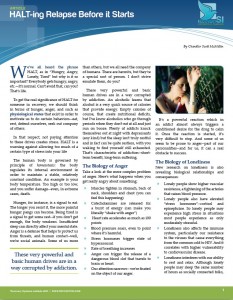 We’ve all heard the phrase HALT, as in “Hungry, Angry, Lonely, Tired” but why is it so important? Everybody gets hungry, angry, etc.—it’s normal. Can’t avoid that, can you? That’s life.
We’ve all heard the phrase HALT, as in “Hungry, Angry, Lonely, Tired” but why is it so important? Everybody gets hungry, angry, etc.—it’s normal. Can’t avoid that, can you? That’s life.
To get the real significance of HALT for someone in recovery, we should think in terms of hunger, anger, and such as physiological states that exist in order to motivate us to do certain behaviors–eat, rest, defend ourselves, seek out company of others.
In that respect, not paying attention to these drives creates stress. HALT is a warning against allowing too much of a certain type of stress into your life
The human body is governed by principle of homeostasis: the body regulates its internal environment in order to maintain a stable, relatively constant condition. An example is your body temperature. Too high or too low, and you suffer damage–even, in extreme cases, death.
Hunger, for instance, is a signal to eat. The longer you resist it, the more painful hunger pangs can become. Being tired is a signal to get some rest—if you don’t get enough, the body weakens. Insufficient sleep can directly affect your mental state. Anger is a defense that helps to protect us from threats, and human contact—well, we’re social animals. Some of us more than others, but we all need the company of humans. There are hermits, but they’re a special sort of person. I don’t strive emulate them, do you?
These very powerful and basic human drives are in a way corrupted by addiction. An alcoholic learns that alcohol is a very quick source of calories that provide energy. Empty calories of course, that create nutritional deficits, but I’ve know alcoholics who go through periods when they don’t eat at all and just run on booze. Plenty of addicts knock themselves out at night with depressants (any kind) but the sleep isn’t truly restful and in fact can be quite restless, with you waking to find yourself still exhausted. That’s characteristic of addiction—short-term benefit, long-term suffering.
The Biology of Anger
Take a look at the more complex problem of anger. Here’s what happens when you get really angry about something:
- Muscles tighten in stomach, back of neck, shoulders and chest (you can feel this happening)
- Catecholamines are released for a burst of energy (can make you literally “shake with anger”)
- Heart rate accelerates as much as 100 points
- Blood pressure soars, even to point where it’s harmful.
- Stress hormones trigger state of hyperarousal.
- Rate of breathing increases
- Anger can trigger the release of a dangerous blood clot that travels to brain or heart.
- Our attention narrows — we’re fixated on the object of our anger.
It’s a powerful reaction which in an addict almost always triggers a conditioned desire for the drug to calm it. Once the reaction is started, it’s very difficult to stop. And some of us seem to be prone to anger—part of our personalities–and for us, it can a real obstacle to success.
The Biology of Loneliness
New research on loneliness is also revealing biological relationships and consequences:
- Lonely people show higher vascular resistance, a tightening of the arteries that raises blood pressure.
- Lonely people also have elevated “ stress hormones”—cortisol and epinephrine. So lonely people may experience high stress in situations most people experience as only moderately stressful.
- Loneliness also affects the immune system, particularly our resistance to the viruses that cause everything from the common cold to HIV. And it correlates with higher vulnerability to cardiovascular disease.
- Loneliness interferes with our ability to rest and relax. Although lonely people may sleep the same number of hours as socially connected folks, they report more fatigue the next day, indicating that the quality of sleep isn’t as good.
- And loneliness seems to feed into a negative spiral, heightening our sensitivity to negative social cues and causing us to view social interactions through a negative lens.
Of course, the “highs” of alcohol and drugs condition us to believe we’re relaxed, so it’s not surprising that drug-seeking kicks in when elevated stress of loneliness takes its toll.
Inoculate Against HALT
Interrupt this process by erecting some barriers between the feeling — tired, hungry, angry, and lonely — and the resulting decision to go back to substance use. And rather than waiting ‘til the problem is atop us, we can practice prevention by establishing a daily routine to keep us steady and relatively stress-free.
Healthy eating pattern. Whether that’s 3 meals and snack before bed, or 5 or 6 small meals a day; whether it’s designed to promote gradual weight loss or gain, or control blood sugar, provide extra energy, or lower the risk of heart disease — make sure it’s a healthy routine.
Regular rest. Some of this has to do with physical activity during the day. Make sure to include periods of aerobic exercise but not close to bedtime. And learn some relaxation exercises to help you go to sleep and if you wake during the night.
Angry—many of us need counseling for this one. There are 2 types: sudden flare of temper–that impulse to say, ‘screw you’ to the world—and also resentments, those long term angers about having been manipulated, taken advantage of, mistreated. Both are problematic. You deal with your temper by learning to recognize the signs that it’s rising and come up with alternate responses. Resentments are a major topic of both 12 Step programs and treatment. The usual process is to go back (in counseling) to the source of those resentments, examine the situation that created them from different perspectives, and see if you can’t resolve some of those feelings. Sometimes just talking openly about them will make a difference. The most difficult resentments are the justified ones, of course.
Lonely–integrate positive human contact into your life. Doesn’t have to be elaborate or terribly intimate. You want to feel like you belong. That’s a lot of what support meetings do. I’ve known people who went to AA meetings every night for months on end, and never really said anything much. But the human contact seemed to make a difference for them. Volunteering can help, too. Plenty of places need a pair of willing hands for a few hours a week.
Now by routine I don’t mean something to beat yourself up for failing every so often to stick to. I do mean a healthy structure for your life. Build it up over time, testing what works for you. That’ll make it easier to succeed.
Would you like to print out a copy of this article? Click the image to download:










